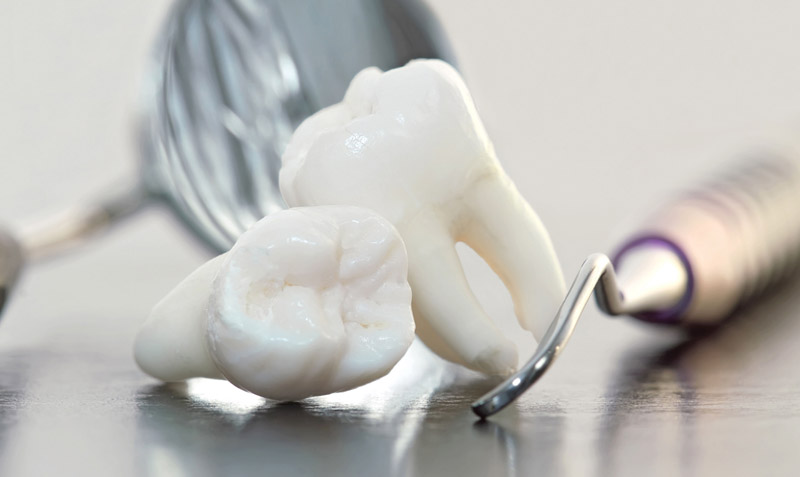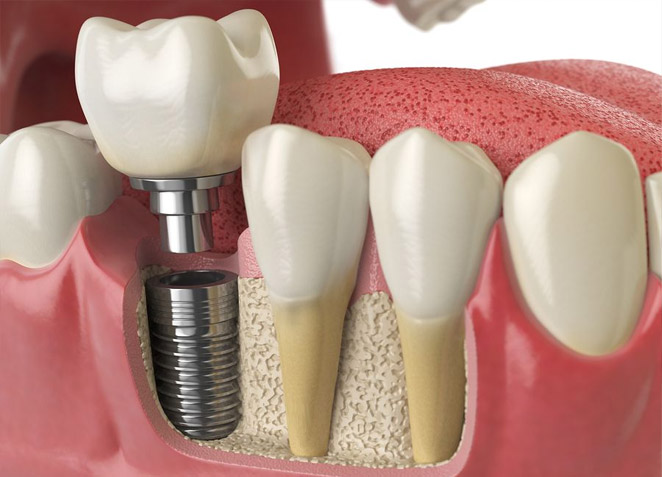Oral Surgery
If you would benefit from one of the oral surgery procedures that we provide, please call our office to schedule an initial consultation and learn more about the treatment process.

Tooth Extractions
There are two types of tooth extractions: simple tooth extractions and surgical tooth extractions.
Simple Extractions
A simple removes visible teeth. During the simple extraction process, The affected tooth is firmly rocked back and forth so as to loosen it for removal. It is common to feel a lot of pressure. You should not feel any pain, just pressure. If, for any reason, you feel pain, please notify your dentist immediately so that they can administer more numbing agent.
Surgical Extractions
When simple tooth extraction is not possible for some reason, such as the tooth being impacted or not enough tooth material being available to grasp for the extraction, removing the teeth will require a same-day surgical procedure.
The most common type of surgical tooth extraction is wisdom tooth removal. The wisdom teeth are particularly prone to becoming impacted because they are the largest teeth in the mouth and most people’s jaws are too small to have room for them to erupt properly.
Impacted wisdom teeth increase the risk of many issues, such as:
- Cysts
- Tumors
- Abscesses
- Infections
- Misaligned teeth
- Discomfort
- Damage to surrounding teeth
To avoid those issues, many patients will opt to have their wisdom teeth removed before any symptoms develop as a preventive measure. Additionally, the extraction procedure is simpler and recovery time shorter in patients under 25 years old, so this can be a consideration.
Dental Implants: A Structurally Complete Solution for Tooth Loss
Dental implants offer patients an innovative structurally complete alternative to replace missing teeth and restore their smiles. Because dental implants are made of titanium, which is biocompatible, the surrounding bone tissue fuses with them over time, and they become fixtures in the patient’s jaw.
Our practice works with different types of dental implants:
- Mini implants
- Conventional implants
- All-on-4 procedures (Note: Gregory Dental Care provides restorations for All-on-4 dental implants and collaborates with local oral surgeons who perform the All-on-4 placement procedure)
Different designs of dental implants may be more or less appropriate in certain cases, and Dr. Gregory can advise you of the best choice for you after evaluating your situation.
Benefits of Dental Implants
Because dental implants are structurally complete and more closely replicate the missing biological tooth or teeth, they outperform conventional bridges and dentures in several areas:
Longevity
Dental implants last longer because they secure the jawbone in addition to holding the appliance in place. As a result, the appliance retains its fit for decades.
Security
Implant-supported dentures stay in place more reliably than standard dentures that rely on denture adhesives.
Convenience
A dental implant stands alone, so it doesn’t require crowns to be placed on surrounding teeth. Nor does it restrict access to the gum line, so patients can brush and floss normally.
Comfort
Because they are structured like natural teeth, dental implants feel more like natural teeth.

Functionality
Dental implants are more effective at chewing because they can tolerate stronger forces than conventional appliances.
Patients will consider many factors when determining how to proceed to restore their smiles after tooth loss, and the dental implant characteristics listed above often come into play.
Bone Grafting: Helping Patients Overcome Bone Loss
Because sufficient bone tissue is so integral to dental implant success, patients who have lost substantial bone tissue may need to undergo bone grafting in advance of dental implant placement to supplement the bone at the site.
With bone grafting, donor tissue is taken from elsewhere in the patient’s body or from an external source and inserted at the identified dental implant site.
Bone grafting does add time to the treatment timeline, but it’s worth the investment, as it reduces the risk of premature implant failure.
Furthermore, not all patients who experience bone loss will need bone grafting, though. Different approaches, such as mini implants or All-on-4 can be appropriate even when bone loss has occurred.
Common Oral Surgery Questions
Am I a candidate for dental implants?
Due to a variety of dental implant designs and placement techniques, many patients can be good candidates for dental implants even if they’ve experienced a small amount of bone loss. However, patients still need to have sufficient bone tissue to support osseointegration, and we will evaluate your case to see if you can proceed with dental implant placement or whether you would benefit from a preliminary bone graft.
How do implants prevent bone loss?
Dental implants prevent bone loss by securing jawbone tissue in the same way that the roots of biological teeth do. In contrast, when no root or root-like structure is present, as is the case with conventional bridges and dentures, the jawbone will gradually atrophy.
How long does it take to recover from wisdom teeth removal?
Most patients will be able to return to work or school within a few days of wisdom tooth extraction, although you will need to hold off on any vigorous activity until healing has progressed more. Keep in mind that post-operative complications will derail your recovery, so you should closely follow our directions to care for the surgical site to minimize your risk of those complications.
What is the recovery time for All-on-4?
Because the dental implants are placed in a single appointment, the typical recovery time from the All-on-4 procedure is a matter of days. However, that timeframe can vary depending on factors specific to the patient. Ask your oral surgeon what a reasonable expectation is in your case.

